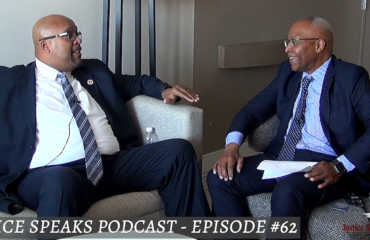Justice Speaks Podcast #64
“Justice Speaks” continues its series of interviews with individuals who impact the Justice System by supervising individuals under community supervision in the form of probation or parole. In this episode, we interview Mr. Scott Taylor, who brings a wealth of experience to our interview as the former Director of the Multnomah County Department of Justice (Portland, Oregon). This episode is brought to you by Reconnect.
Scott Taylor’s Journey into Criminal Justice Supervision
Scott Taylor begins by telling us about his journey into the world of criminal justice supervision. Reflecting on his early ambitions, Director Taylor shares how he initially dreamed of pursuing a career as a police officer. However, through a series of unforeseen events, he stumbled upon an internship opportunity at a local probation office. He tells us that despite his initial reservations, he decided to seize the opportunity, viewing it as a stepping stone toward his ultimate goal of law enforcement.
Probation’s Parole Officer’s Vital Role
As he delves into his experiences as a Probation Officer, Director Taylor discusses the multifaceted nature of the role, emphasizing the importance of empathy, communication, and resourcefulness in effectively supervising individuals under community supervision. He then talks about the complexities and challenges of navigating the justice system from the point of view of a probation officer.
Throughout the interview, Mr. Taylor underscores the vital role of probation and parole officers in promoting rehabilitation, reintegration, and community safety. He emphasizes the need for a holistic approach that addresses the underlying factors contributing to individuals’ involvement in the justice system, advocating for a shift toward a more compassionate and rehabilitative model of supervision.
AI’s Future Impact on Criminal Justice Supervision
In a thought-provoking discussion about the future of criminal justice supervision, Director Taylor touches upon the role of Artificial Intelligence (AI) in transforming the landscape of supervision. He suggests that AI can revolutionize data analysis, risk assessment, and decision-making processes within probation and parole services. Director Taylor says that AI-powered tools may be able to analyze vast amounts of data to identify patterns and trends, allowing probation and parole officers to make more informed decisions and allocate resources more effectively. He emphasizes the importance of integrating AI technologies into supervision practices while also acknowledging the ethical considerations and potential challenges associated with their implementation.
Looking ahead, Mr. Taylor foresees a time where probation and parole services are more accessible, equitable, and responsive to the diverse needs of the communities they serve. As part of this future, he calls for greater investment in alternative sentencing programs, mental health resources, and social services, recognizing the pivotal role these initiatives play in breaking the cycle of incarceration.
Wrap Up
In conclusion, Director Taylor offers his insights into the evolving landscape of criminal justice supervision, highlighting the transformative potential of compassionate and community-centered approaches.
We wish to thank Mr. Taylor for sharing his insights and experiences on Justice Speaks. We also wish to thank Reconnect for sponsoring this podcast episode.
Additional Resource
You can watch this interview by going to the Justice Speakers Institutes’ YouTube Channel or by clicking here.
Get more articles like this
in your inbox
Subscribe to our mailing list and get the latest information and updates to your email inbox.
Thank you for subscribing.
Something went wrong.







